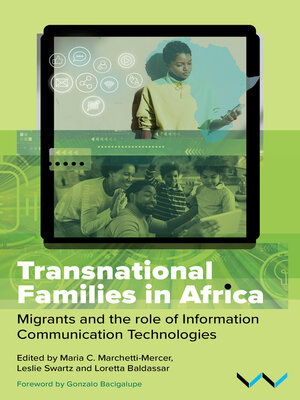Transnational Families in Africa
ebook ∣ Migrants and the role of Information Communication Technologies
By Maria C Marchetti-Mercer

Sign up to save your library
With an OverDrive account, you can save your favorite libraries for at-a-glance information about availability. Find out more about OverDrive accounts.
Find this title in Libby, the library reading app by OverDrive.



Search for a digital library with this title
Title found at these libraries:
| Library Name | Distance |
|---|---|
| Loading... |
This is the first book to capture the poignant stories of transnational African families and their use of Information and Communication Technologies (ICTs) in mediating their experiences of migration and caring across distance. Transnational Families in Africa analyses the highs and lows of family separation as a result of migration in three contexts: migration within South Africa from rural to urban areas; migration from other African countries into South Africa; and middle-class South Africans emigrating to non-African countries. The book foregrounds the importance of kinship and support from extended family as well as both the responsibilities migatory family members feel and the experience of loss by those left behind. Across the diverse circumstances explored in the book are similarities in migrants' strategies for keeping in touch, but also large differences in relation to access to ICTs and ease-of-use that highlight the digital divide and generational gaps. As elsewhere in the world, and in spite of the varied experiences in these kinship circles, the phenomenon that is the transnational family is showing no signs of receding. This book provides a groundbreaking contribution to global debates on migration from the Global South.|This is the first book to capture the stories of transnational African families and their use of Information and Communication Technologies (ICTs) in mediating their experiences of migration and caring across distance. Transnational Families in Africa analyses the highs and lows of family separation as a result of migration in three contexts: migration within South Africa from rural to urban areas; migration from other African countries into South Africa; and middle-class South Africans emigrating to non-African countries. The book foregrounds the importance of kinship and support from extended family as well as both the responsibilities migratory family members feel and the experience of loss by those left behind. Across the diverse circumstances explored in the book are similarities in migrants' strategies for keeping in touch, but also large differences in relation to access to ICTs and ease-of-use that highlight the digital divide and generational gaps. As elsewhere in the world, and in spite of the varied experiences in these kinship circles, the phenomenon that is the transnational family is showing no signs of receding. This book provides a groundbreaking contribution to global debates on migration from the Global South.







